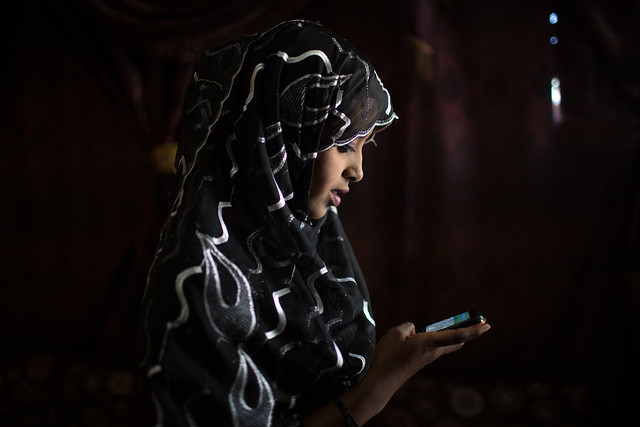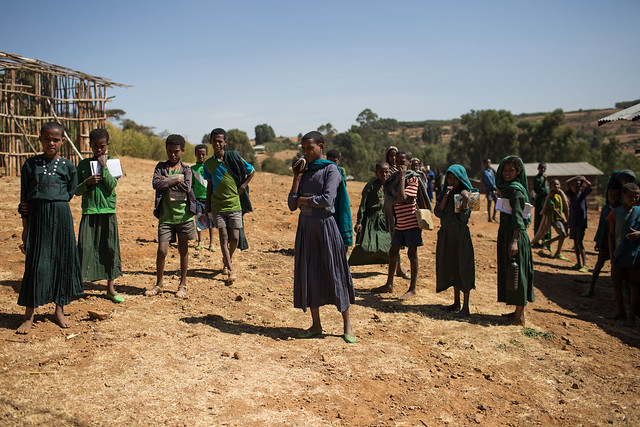Theme of the Day of the African Child 2015: “25 Years after the Adoption of the African Children’s Charter: Accelerating our Collective Efforts to End Child Marriage in Africa”

NEW YORK/ADDIS ABABA, 16 June 2015 – Child marriage remains a brutal reality for millions of girls across Africa, denying them the right to live healthy and fulfilling lives.
Poverty, lack of education, gender stereotyping, discrimination and negative religious practices have resulted in millions of these girls being married off before their 18th birthday.
In Ethiopia, Child Marriage of girls is prevalent throughout the country and is clearly a gender issue, given the considerable difference between men and women in age at marriage. According to the Ethiopian Demographic Health Survey (EDHS) of 2011, the median age at first marriage for women is 17.1, almost a year below the legal age of marriage, whereas the median for men was six years older, at 23.1.
“Child Marriage affects girls in various ways and denies their right to fully develop their potential and be in charge of their destiny,” said Ms. Gillian Mellsop, UNICEF Representative to Ethiopia. “Hence, Ethiopia is heading in the right direction due to the concrete actions taken by the Government and its developments partners including the adoption of a national strategy on Harmful Traditional Practices, the formation of a national alliance to end child marriage, the strong commitments made by the government at the July 2014 Girls Summit in London to end child marriage and FGM/C by 2025.”

UNICEF in collaboration with other stakeholders is currently supporting the government of Ethiopia in meeting their commitments. UNICEF will continue to support the scale up of programmes and interventions which have proven to have a positive impact on girls and women empowerment. The programmes will also ensure that the various interventions deliver concrete results for the girls through proper monitoring and evaluation systems.
The magnitude of violations occasioned in a single act of marrying off a child cannot be underestimated. In the worst of cases, a girl who becomes pregnant when her body is not yet ready may die at childbirth. Her baby may also not survive: a double tragedy. Infants born to adolescent mothers are 60 per cent more likely to die in their first year, and are more likely to be malnourished.
“We cannot downplay or neglect the harmful practice of child marriage, as it has long term and devastating effects on these girls whose health is at risk and at worst leading to death due to child birth and other complications,” said Dr. Nkosazana Dlamini-Zuma, Chairperson of the African Union Commission.
The African Union Campaign to End Child Marriage in Africa encourages governments across the continent to set the minimum age of marriage at 18 years. The Campaign also focuses on strengthening families and communities to protect their children, and ensuring they have access to key information and services of quality.
The Day of the African Child (DAC) will serve to shine a brighter spotlight on the contribution that young people are making to accelerate the movement towards ending child marriage at multiple levels. From young reporters who publish stories on child marriage, to young people who speak at international fora, to those who take part in discussions with their families, their peers and their communities about the benefits of delaying marriage and pregnancies and in action to end the practice – they are important agents of change. Their role can be further enhanced through the provision of life skills, quality education and training.
This year’s DAC will be 25 years since it was first marked, and will focus on ending child marriage in Africa. While the DAC commemorations are held on 16 June each year across countries in Africa, the official continental commemoration will take place in Soweto, South Africa, on 15 June 2015.
The DAC also coincides with the twenty-fifth anniversary of the adoption of the African Charter on the Rights and Welfare of the Child (ACRWC), and an opportunity to reinforce the commitment by African governments to children’s rights, while examining the main achievements and challenges in the implementation of the ACRWC.
Hundreds of children from South Africa will be joined in Soweto by others from across Africa, to commemorate the DAC and further urge the African leadership to do more for children, especially in ending child marriage.